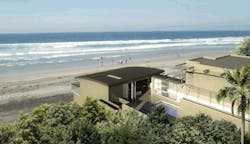LAGUNA BEACH, CALIF. — It doesn’t get more “California” than Laguna Beach. Located in Orange County, the city boasts spectacular ocean views, a thriving arts community, high-end resorts, gorgeous beaches, the occasional reality TV show, and was even once the home of Timothy Leary and his Brotherhood of Eternal Love.
It’s the perfect spot to build a $13 million-dollar luxury beachfront home like the one being constructed now by Tresor Properties (http://www.tresorproperties.com/). But Tresor is pushing the envelope even for environmentally-conscious California; they hope to have the project certified U.S. Green Building Council LEED Platinum, the highest level of accreditation offered by the USGBC.
“We’ve always been a sustainable builder, but on this specific home we wanted a measurable third-party audit,” John Fishbeck, president and founding partner of Tresor Properties, says.
Fishbeck is a builder and developer trying to differentiate himself and his work in a crowded market — something he hopes LEED certification will accomplish. But Fishbeck is also a true believer, concerned that the way the world uses its resources is going to create huge problems for future generations. He thinks at least part of the solution needs to be in innovation, and that the current building industry is behind the curve.
“The construction industry really hasn’t changed in a lot of years,” Fishbeck says. “There are a lot of innovations — some coming out of Europe — that I think are fantastic. There’s a lot of ingenuity in the U.S. that needs to be tapped. The construction industry is very traditional, and I think it’s time to up the ante on innovation.”
Among the many innovations incorporated in the project is a packaged solar water heating system — the Cirrex from A.O. Smith (http://www.hotwater.com/products/residential/cirrex_solar.html) — that will be installed in the coming weeks by Damon Kellogg of B&D Professional Plumbing (http://bdproplumbing.com/). Kellogg has been in the plumbing industry for 27 years, the past 20 with his partner Bill Hambley.
“We’ve got the panels on the roof, and we’ve done a partial hook-up,” Kellog says. The panels are manufactured by Chromagen (http://chromagen.com/), and are flat thermal collectors. Because the Cirrex is a packaged system, Kellogg said the rooftop portion of the install was “pretty straightforward.” That portion of the job included bracketing the panels and running piping through the roof to the mechanical room.
Glycol heat-transfer fluid is pumped to a heat exchanger that moves the thermal energy to the water in the storage tank. “It’s a 120-gal. tank,” Kellogg says, “so they’ll have plenty of hot water.” A good thing since the plans for the house have a powder room, three bathrooms, including the master bath, and a spa adjacent to the pool.
The Cirrex system incorporates a back-up gas-fired heater for days when solar energy alone cannot keep up with the hot water demand. But, seeing as it’s sunny southern California, Kellogg expects the solar system to supply more than 70% of the building’s water heating needs.
Also on the roof is a photovoltaic module from Lumos (www.lumossolar.com) to supply electricity to the lighting, appliances and A/C system. “A home like this,” Fishbeck says, “the recommended solar array is 9.5 kW. Because of the efficiencies in the home — the insulation and the windows with their solar heat gain coefficients — the array only needs to be 6.5 kW.”
The insulation is a blown-in product, Knauf Progressive Insulation (http://www.knaufinsulation.us/). The insulation has no VOCs, a factor which contributes towards LEED points since both construction as well as operation of the building needs to be environmentally sound. The windows are from an Italian company, STR Infissi (http://www.strinfissi.it/), and feature aluminum-alloy frames and an extremely high insulation factor. As a beachfront home, it would be a shame to waste the view, so many of the walls feature large panoramic windows.
And since water conservation is an important part of LEED certification — and a growing concern in general for southern California — the house incorporates a number of water-saving measures. All faucets and fixtures are from Rohl (http://www.rohlhome.com), and combine both luxury appearance with low-flow performance.
The pool features its own surge tank, so water isn’t wasted down the drain or into a flower bed when people jump in the pool. Instead the overflow is captured and then, when the swimmer gets out, flows right back into the pool.
The house is also equipped with at 1,500-gal. cistern and a small aquifer to capture any sub-surface water. “All the rainwater, anything that hits the drains off the roof or the patios ends up there,” Fishbeck says. The water is then used for all the landscaping on the site.
At the heart of the house is a Crestron home automation system (www.crestron.com). It not only controls the water heater, the AC, heat, lighting, pool equipment and security, it even controls the window shades.
“All the louvers, all the window shades are all handled by the system,” Fishbeck says. “It understands where the sun is at any given time and can open or lower the shades automatically to maximize heating or cooling efficiency.”
The Crestron features an energy management system allowing the user to evaluate and manage all the energy offsets the home provides. It has a graphic readout and can display trends over time. Eventually the homeowner will be able compare the current month’s energy costs with the same data from the previous year.
Fishbeck expects the home to be completed by the end of October. “Right now,” he says, “we’re about halfway through wrapping up plaster.” So for anyone out there looking for a weekend getaway with a few million dollars to throw around, the view is spectacular, and the energy efficiency can’t be beat.
About the Author
Steve Spaulding
Editor-in-Chief - CONTRACTOR
Steve Spaulding is Editor-in-Chief for CONTRACTOR Magazine. He has been with the magazine since 1996, and has contributed to Radiant Living, NATE Magazine, and other Endeavor Media properties.
